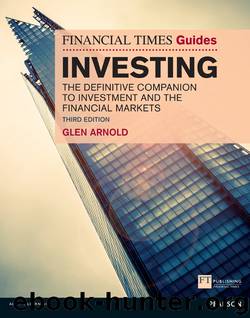The Financial Times Guide to Investing by Glen Arnold

Author:Glen Arnold [ARNOLD, GLEN]
Language: eng
Format: epub
ISBN: 9781292005164
Publisher: Pearson Education Limited
Published: 2014-01-05T16:00:00+00:00
Share (stock) options
Imagine you own 50 per cent of the shares in X plc. There are 10 million shares in issue. The company has a share option scheme in which directors are entitled to buy, in three years’ time, 1 million shares at £1 each (the same as the current share price). Now imagine that the three years have passed and the share price has risen to £3. The directors have a bonanza. They can now exercise the option to purchase £3 million worth of shares for a third of the price.
This type of scheme is quite common and can be useful to incentivise managers. However, the difficulty comes in accounting for share options. Suppose the company at the end of the three years is making annual profits of £2 million, so before the exercise of the options you, as a 50 per cent shareholder, have a £1 million claim on the profits – 20p per share. If the options are exercised the number of shares in issue rises to 11 million. Then each share has a claim on only £2m/11m = 18.18p. Your claim is 5m × 0.1818 = £909,090. You have lost out because the directors now have a claim on 9 per cent of the company’s profits.6 This is a cost to you, the shareholder.
In the past most companies failed to properly acknowledge share options as a cost to the shareholders – the best that was offered was a note in the accounts. Thousands of directors became very wealthy as a result of share option schemes. That wealth came from somewhere, and yet rarely was the cost to shareholders properly recorded. Sure, the earnings per share figure was ‘diluted’ to allow for the possibility of the issue of additional shares, but the headline profit reported on the face of the accounts generally ignored the cost.
If managers had been incentivised through a cash bonus scheme of £2 million, this would have been highly visible and profit would have been depressed. Given this, why not express the share-option-based transfer of shareholder wealth as a cost? The accounting regulators now insist that the value of options be assessed at the date they were granted (even if they are ‘out of the money’ – see Chapter 8) and charged to that year’s income statement. This is different to either (a) ignoring option values (as UK companies used to do) or (b) only valuing the option when and if it is exercised, or (c) only valuing the option prior to the exercise if it has intrinsic value, i.e. the option is ‘in the money’. The main problem with the solution chosen is that the models used to calculate out-of-the-money option values are complex and full of bold assumptions.
Download
This site does not store any files on its server. We only index and link to content provided by other sites. Please contact the content providers to delete copyright contents if any and email us, we'll remove relevant links or contents immediately.
Rich Dad Poor Dad by Robert T. Kiyosaki(6607)
Pioneering Portfolio Management by David F. Swensen(6288)
How To Win Friends and Influence People by Dale Carnegie(4498)
The Money Culture by Michael Lewis(4198)
The Dhandho Investor by Mohnish Pabrai(3758)
The Wisdom of Finance by Mihir Desai(3731)
Liar's Poker by Michael Lewis(3441)
Fooled by Randomness: The Hidden Role of Chance in Life and in the Markets by Nassim Nicholas Taleb(3105)
The ONE Thing by Gary Keller(3063)
The Intelligent Investor by Benjamin Graham Jason Zweig(3035)
Mastering Bitcoin: Programming the Open Blockchain by Andreas M. Antonopoulos(3035)
The Psychology of Money by Morgan Housel(2970)
Investing For Dummies by Eric Tyson(2948)
Rich Dad Poor Dad: What The Rich Teach Their Kids About Money - That The Poor And Middle Class Do Not! by Robert T. Kiyosaki(2948)
How to Day Trade for a Living: Tools, Tactics, Money Management, Discipline and Trading Psychology by Andrew Aziz(2942)
How to Win Friends and Influence People by Dale Carnegie(2906)
Market Wizards by Jack D. Schwager(2696)
How to Pay Zero Taxes, 2018 by Jeff A. Schnepper(2646)
Zero Hour by Harry S. Dent Jr. & Andrew Pancholi(2644)
